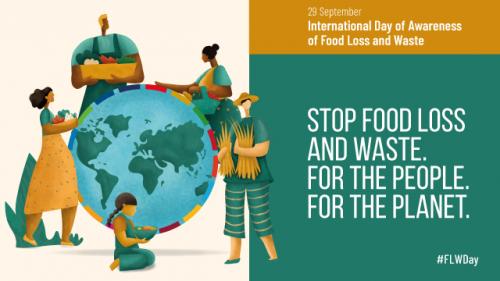
https://www.fao.org/international-day-awareness-food-loss-waste/en/
Why is it important to reduce food loss and waste?
Around 14 percent of the world's food is lost after harvest, up to - but not including the retail stage of the supply chain, and an estimated 17 per cent is wasted in retail and at the consumption level.
This food loss and waste account for 8 -10 per cent of the total global GHGs - contributing to an unstable climate and extreme weather events such as droughts and flooding. These changes negatively impact crop yields, reduce the nutritional quality of crops, cause supply chain disruptions and threaten food security and nutrition.
The 2030 Agenda for Sustainable Development – specifically SDG 12, target 12.3 – calls for halving per- capita global food waste at the retail and consumer levels and reducing food losses along production and supply chains.
An estimated 3.1 billion people worldwide do not have access to a healthy diet and some 828 million people go hungry. All of this means there is an urgent need to accelerate action to reduce food loss and waste.
With eight years left to reach the target, the urgency for scaling up action to reduce food loss and waste cannot be overemphasized. Reducing food loss and waste presents an opportunity for immediate climate benefits while improving the overall sustainability of our food systems – a necessary transformation to ensure better planetary and nutritional outcomes for current and future generations.
Get Involved
Download the Get Involved guide for the 3rd edition of the International Day of Awareness of Food Loss and Waste.
Key messages
1. As the world’s population continues to grow, our challenge should not be how to grow more food; but reducing food loss and waste in a sustainable manner, is an immediate need if we are to maximize the use of food produced to feed and nourish more people
2. Prioritizing the reduction of food loss and waste is critical for the transition to sustainable food systems that enhance efficient use of natural resources, lessen planetary impacts and ensure food security and nutrition.
3. Reducing Food Waste is one of the most impactful climate solutions
4. Climate smart innovation, technologies, and infrastructure to reduce food loss and waste are key to increasing efficiency and reducing food system emissions.
5. Food is never waste! By applying circular practices, lost and wasted food can be converted to compost, or used to produce biogas, thereby avoiding harmful methane emissions.
6. Good governance, human capital development, collaboration and partnerships are essential in maximising the positive impacts of reducing food loss and waste.










Add new comment